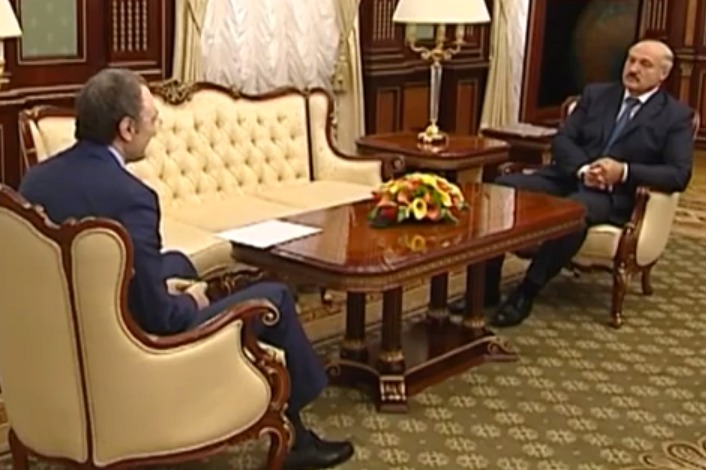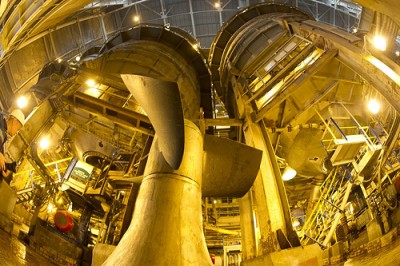
Kerimov meets with President Lukashenko in March 2013. YouTube screenshot.
At first glance, there are no truer friends than Russia and Belarus. The two states are united by a common history and have strong ethnic and linguistic links. Russia has long subsidized her neighbor with cheap oil and gas, which has kept Belarus’ Soviet-era manufacturing industry from keeling over. For Russia's Vladimir Putin, Belarus is a key linchpin in a new “Customs Union“, a geopolitical block he hopes can become a major, Russian-led, international force.
Despite these close links, Belarus and Russia have had disagreements in the past, and their presidents, Lukashenko and Putin, are widely suspected to personally dislike one another. The occasionally tumultuous relationship was strained further than usual on August 28 2013, when Belarusian authorities arrested Vladislav Baumgartner, CEO of Uralkaliy, a large Russian potash mining company. He was detained after arriving to the country at the invitation of the Belarusian prime minister. Russia retaliated by cancelling some of its subsidies and banning Belarusian pork imports. Belarus shows no sign of backing down and has put out an Interpol warrant for Uralkaliy majority shareholder Suleiman Kerimov, a Dagestani oligarch and Senator with close links to the Kremlin.
Uralkaliy had for years been part of a profitable joint venture (many would say cartel) with Belaruskaliy, the Belarusian state-owned potash company. Potash is Belarus’ second most important export and a key part of its largely state-run economy. Problems had arisen when the global price of potash had plummeted and both companies attempted to conduct business on the side without informing the other, further depressing the price. Uralkaliy ultimately unilaterally withdrew from the consortium in July 2013.

Uralkali Potash Plant in Magadan, Russia, June 29 2011, Photo by ICT Group CC3.0
The affair has left many in Russia shaking their heads, as on the surface Belarus needs Russia more than Russia needs it, and any burgeoning trade war could have serious repercussions. Many saw the split between the two large potash companies as evidence of a deeper conspiracy. Writing on his LiveJournal, conspiracy theorist Nikolino saw Putin's invisible hand [ru] behind the whole affair.
После ареста Владислава Баумгертнера ряд экспертов высказал мнение о том, что за произошедшим в Минске стоит чуть ли не лично Владимир Путин, решивший таким образом наказать Сулеймана Керимова, входящего в «медведевский» пул олигархов… Те, кто придерживался менее радикальной точки зрения, утверждали, что даже если Путин и не сам организовал всю эту ситуацию, то он, по крайней мере, не будет слишком усердно защищать хозяев «Уралкалия».
After Baumgartner's arrest a host of experts expressed the opinion that standing behind the events in Minsk was none other than Vladimir Putin himself, deciding in this way to punish Suleiman Kerimov, for belonging to “Medvedev's” circle of Oligarchs… Those who possess a less radical point of view maintain that even if Putin didn't personally organise this situation himself, then at the very least he isn't going to try very hard when defending Uralkaliy's owners.
Nikolino referenced an article [ru] on IAREX [ru], a Russian expat news portal, by Spain-based political commentator Lev Vershinin, who claimed Kerimov was “one of the main sponsors of the anti-Putin campaign between November 2011 and March 2012.”
Others argued that the impetus for the disagreement came not from Moscow, but from the west. Mikhail Delyagin, a Russian academic and anti-globalisation politician released a 20 minute video, arguing that the whole affair was instigated by the Kremlin's “liberal” faction.
Для либерального клана, самая страшная что есть на пост-советском пространстве, это ре-интеграция этого пост-советского пространства с участием России. Не потому, что либеральному клану не нравится пост-советское пространство, а потому что этот клан обслужит интересы глобального бизнеса, которому, во первых не нужна российская федерация как что то сильное. Россия должна быть такая уже трофейная пространство как Египет или Ливия, или Сомали. Чтобы можно было осваивать малыми ресурсами.
For the liberal clan, the worst thing in the post-Soviet space is Russia's reintegration with this post-Soviet space. Not because this liberal clan hates the post-Soviet space, but because this clan serves the interests of global business, which first and foremost doesn't need a strong Russia. Russia needs to be an already defeated country like Egypt of Libya or Somalia, so it can be exploited with little effort.
Delyagin went on to claim that the liberal clan of oligarchs was attempting to sabotage the Customs Union by sowing disharmony between Belarusian President Alexander Lukashenko and Vladimir Putin.
Other Russian commentators took a more prosaic view of the affair. Yaroslav Romanchuk, in a blog [ru] for Ekho Moskvy, chalked the issue up to Baumgartner's naivety.
Владислав Баумгертнер решил поиграть с «Беларуськалием» по правилам российского рынка, по тем схемам, которые используются даже на Западе для захвата предприятий или рынков. Он не учёл, что играет не столько в корпоративную игру с «Беларуськалием», сколько политическую игру с А. Лукашенко.
Vladislav Baumgartner decided to play with Belaruskaliy according to the rules of the Russian marketplace, using the schemes which can be used even in the West for seizing an enterprise or a market. He didn't consider that he wasn't so much playing a corporate game with Belaruskaliy, but a political game with Lukashenko.
Few netizens have much sympathy for Baumgartner, who faces a daunting 10 years in a Belarusian prison for actions that, as Romanchuk correctly points out, would not be considered illegal in the west. Instead of indignation at Lukashenko's actions, many seem to approve of them, as a bold defense against Russia's oligarchs, still much reviled by the populace. Kerimov may be one of Russia's rich and powerful, but judging by the Uralkaliy affair, few would shed tears if he ended up joining Baumgartner in a Minsk prison cell.








6 comments
Dear Mr. Alan Kennedy, please be so kind and use the correct term BELARUSIAN instead the wrong term ‘belorussian’)
We expect you to correct the article. Thank you!
Apologies! It’s fixed now.
Thank you for your kindness!